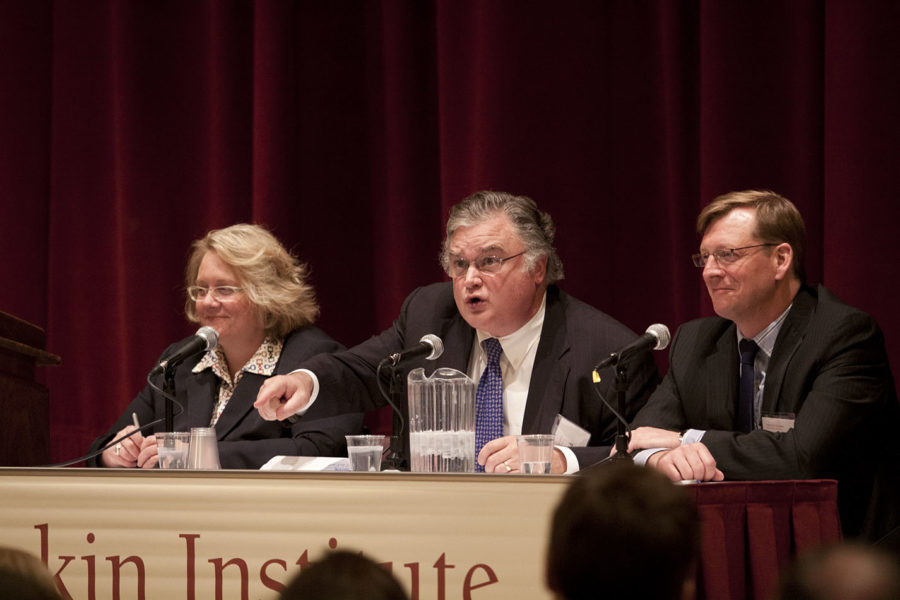Political experts discuss future of Iowa caucuses
Photo: Lindsey Lippincott/Iowa State Daily
JoDee Winterhof, left, David Yepsen and Terry Nelson discuss the benefits and detriments of having Iowa be the first state to have its caucuses. The panelists suggested future changes to Iowa’s caucus rules.
December 4, 2012
“The Iowa caucuses are a place where unknown candidates can get a start.”
Steffen Schmidt, professor of political science, stated this in a video at the start of a panel discussing the future of the Iowa Caucuses.
The Harkin Institute of Public Policy hosted the panel Monday to discuss the Iowa caucuses, which kicks off the starts of the presidential elections.
The panel discussed the need for the caucuses and what alternations were needed.
The panel consisted of Terry Nelson, the National Political Director in 2004 for Bush-Cheney; JoDee Winterhof, former chief of staff for Sen. Tom Harkin; and David Yepsen, director of the Paul Simon Policy Institute at Southern Illinois.
Yepsen, who also served as the moderator, pointed out that the caucuses are important since many people get involved with politics because of the caucuses.
“My view is that the caucus on the Republican side will continue to be important because Iowans take their duty serious when determining their candidate,” Nelson said.
Iowans’ serious attitude toward the caucuses was also highlighted by Winterhof, who said the caucuses allowed candidates to meet and talk with people more.
If larger states’ primaries were pushed to go before Iowa’s caucus, she said, the whole process would just turn into a media campaign.
Both also pointed out the amount of coverage each candidate receives by partaking in the caucuses and that when candidates skipped Iowa, they lose the national coverage that is part of the Iowa caucuses.
“If you talk to the media about the caucuses, they get to get up close with the candidates more than in other states, and along with the fact that candidates are able to get up close with people more,” Winterhof said.
An area the panel stated needed to be improved in order for the Iowa caucuses to have continued success was the improvement of quality control.
A way quality control could be improved is to make sure the vote count is finished in a timely fashion. Another suggestion was made to make uniform rules across the nation for caucuses and primaries to speed up the process.
“Uniform rules will never happen,” Nelson said. “Having the Republican National Convention telling a state how to do their caucus will not work.”
The panel also made the comment that the caucuses could be changed from a week night to the weekend in order to boost attendance.
“A weekend event sounds good to me; Saturday is an ideal day to me because of the accessibility,” Yepsen said. “Saturday night at 6:30 will allow more people to attend.”
Nelson said during the panel that at the next Republican convention, rule changes would be implemented.
One rule states delegates’ votes must reflect their state’s vote from caucus night.
This rule change came about after Mitt Romney and Rick Santorum both received 25 percent of the Iowa Caucus vote, but 22 of Iowa’s 28 delegates voted for Ron Paul instead at the Republican National Convention, with Romney receiving six votes.







